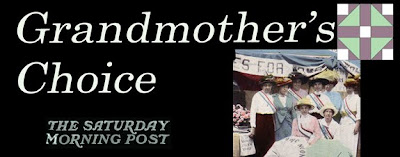Nameless Star
By Becky Brown
The Nancy Cabot column in the Chicago Tribune printed this classic nine-patch star in the 1930s
with the title Nameless Star. We'd probably call it a sawtooth star or a
variable star. The pattern without a name can remind us of a woman's right to
keep her own name when she marries.
Lucy Stone, 19th-century women's rights advocate, was
well-known for refusing to change her name when she wed in 1855. "A wife should
no more take her husband's name than he should hers. My name is the symbol of
my identity and should not be lost."
Her choice inspired a group of journalists coming of
age in the 1910s during the fight for the U.S. Constitutional Amendment for
women's voting rights. When Ruth Hale married Heywood Broun in 1917 and Jane
Grant married Harold Ross in 1920 they wanted to keep their professional names,
an act of independence that completely befuddled the legal and social systems.
One could not vote, check out a library book or register at a hotel if one did
not meld one's identity into one's husband's. Hale and Grant founded the Lucy
Stone League in 1921 to work for that right and promote "the idea that its
women are integers and not halves."
The League languished in the late 1920s but their goals were
revived again in the 1960s when a new generation of women realized their birth
names were important symbols of their independence. It took till the 1970s for
the Lucy Stoners to win their fight when the courts established a person's
right to use the name they choose.
Jane Grant
Jane Grant's first husband Harold Ross is often given sole credit for
founding the New Yorker magazine in
1925 but she was his partner in shaping editorial goals, creating readership
and funding the new magazine. As a New
York Times reporter she had connections, skills and income during the first
few years of publication. After their 1929 divorce the institutional memory of
her role began to fade. With her second husband she became a dedicated gardener
and they founded White Flower Farm, a mail order plant source.
White Flower Farms will ship you a Jane Grant Rhododendron.
Nameless Star
By Georgann Eglinski
BlockBase #2138d.
A - Cut 4 squares 2-1/2".
B - Cut 1 square 4-1/2".
C - Cut 4 squares 2-7/8".
Cut each in half diagonally to make 2 triangles. You need 8
triangles.
D - Cut 1 square 5-1/4" (5-3/16" if you use the BlockBase 1/16th default.)
Cut with 2 diagonal cuts to make 4 triangles. You need 4
triangles.
Cutting a 12" Block
A - Cut 4 squares 3-1/2".
B - Cut 1 square 6-1/2".
C - Cut 4 squares 3-7/8".
Cut each in half diagonally to make 2 triangles. You need 8 triangles.
D - Cut 1 square 7-3/16".
Cut with 2 diagonal cuts to make 4 triangles. You need 4 triangles.
Nameless Star
By Becky Brown
Read more about Jane Grant:
Join the Lucy Stone League:
And read their history:
Read a 1922 NY Times story about the controversy over women
using their "antenuptial names."
See a preview of Susan Henry's 2012 book
Anonymous in Their Own
Names: Doris E. Fleischman, Ruth Hale, and Jane Grant
Nameless Star
By Dustin Cecil
Cutt a















I like the blue variation of the Nameless Star. Beautiful!
ReplyDeleteI am a proud Lucy Stoner. I am not nameless, I retain my own birth name and do not promote the common law principle of Coverture, by which a woman was required to lose both her own name and identity upon marriage. The quilt squares are nice, too.
ReplyDelete